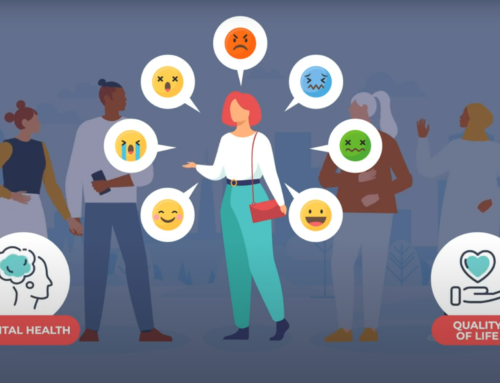When it comes to the overall well-being of a patient undergoing oncological care, managing one’s mental health is as important as taking care of one’s physical health.
Healthcare professionals with responsibility for cancer patients are now focused on the mental health of their patients more than ever before. Throughout a patients’ cancer diagnosis, treatment, and after-care, it is now commonplace to ask patients about their mental health and respond accordingly, should an issue be identified.
However, despite our increased awareness of the importance of mental health, many people struggle to prioritise their mental health and this can have many negative consequences.
Consequences of Mental Health Issues
Mental illness covers a range of mental, emotional, and behavioural disorders. This includes major depression, anxiety disorders, bipolar disorder, schizophrenia, and post-traumatic stress disorder (PTSD).
The World Health Organisation’s (WHO) European mental health programme works with member states and other partners to develop and implement national mental health policies and plans that reflect the WHO vision of “no health without mental health”. Following this logic, the road to recovery for cancer patients suffering from mental health issues may negatively impact their ability to resume normal day-to-function and maintain their quality of life.
Signs of Mental Health Challenges
Like other serious diseases, such as cancer or diabetes, mental illness is a medical issue that requires treatment. Left untreated, mental illness can get worse and lead to other health issues.
The impact of mental illness can range from mild to severe impairment; the range of symptoms depend on the nature of the disorder. The following are common signs of mental health challenges for adults and adolescents.
- Feeling down or unusually sad
- Excessive worries or fears
- Extreme mood changes, including extreme euphoria or feeling “high”
- Sleep problems, either sleeping too much or not being able to sleep
- Difficulty getting out of bed because of mood
- Feeling tired for no reason
- Physical ailments without a cause, such as headache, stomachache, or general pain
- Appetite changes
- Gaining or losing weight without trying
- Changes in sex drive
- Difficulty focusing or learning
- Confused thinking
- Feelings of guilt or lack of self-worth
- Avoiding friends, family, or other social contacts
- Loss of interest in things you once enjoyed
- Unable to perform routine daily tasks, such as work or cleaning your home
- Excessive alcohol use or substance abuse
- Flawed perception of reality, such as hallucinations or hearing voices
- Thoughts of self-harm or suicide
When You Should Seek Help
It’s normal to feel sad or anxious depending on what’s going on in your life. Receiving a cancer diagnosis, going through cancer treatment – and the side-effects this can bring – and the impact that cancer can have on your lifestyle and your family can cause situational depression or anxiety. These mental health challenges can be temporary, or they may trigger underlying mental health issues.
You can often manage mild symptoms (those that don’t interfere with daily tasks) with the self-care tips listed below. These self-care tips can help protect mental health, no matter the person’s mental health status. They can also help people manage mild or situational mental health issues lasting less than 2 weeks. They are:
- Exercise on a regular basis
- Socialise, either in person or virtually
- Get adequate and consistent sleep
- Eat a healthy, well-balanced diet
- Confide in a trusted friend or family member
- Practice mindfulness meditation or other relaxation techniques, such as yoga
- Attend an oncology rehabilitation programme that may be running in your area. Your consultant, oncology team, or GP may be able to advise you on where you can access these programmes.
When it comes to taking care of your mental health, the medical advice is that if a person is experiencing mental illness symptoms, similar to ones listed above, either at a mild or severe level and if these symptoms last for longer than a period of 2 weeks or more, professional medical help should be sought.
The FAITH Research Project Approach
The FAITH research project believes in a holistic, multidisciplinary approach to cancer care and survivorship and is therefore working towards creating an innovative solution, based on the latest AI technologies, to support the mental wellbeing of post treatment cancer survivors. UPMC in Ireland is proud to be the main Irish pilot and trial site, working with partners to assist in the development of this new technology and ultimately to improve the management of mental health for cancer patients.
Reviewed by the UPMC Hillman Cancer Center.




